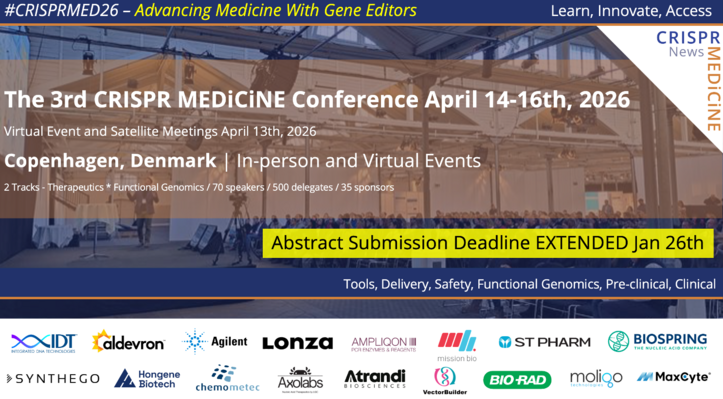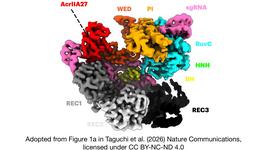CMN Weekly (11 November 2022) - Your Weekly CRISPR Medicine News
By: Gorm Palmgren - Nov. 11, 2022
CMN Intelligence - The World’s Most Comprehensive Intelligence Platform for CRISPR-Genomic Medicine and Gene-Editing Clinical Development
Providing market intelligence, data infrastructure, analytics, and reporting services for the global gene-editing sector. Read more...
Top picks
- The primary patient of an N-of-1 clinical CRISPR trial tragically died less than two months after FDA approved the trial. However, no official statement has currently linked the trial and the death. The trial, CRD-TMH-001, was carried out by the non-profit organization Cure Rare Disease, and the diseased patient was the brother of the organization's founder, Rich Horgan. The trial intended to upregulate an alternate form of the dystrophin protein using CRISPR technology, thereby stabilizing or potentially reversing symptom progression of Duchenne muscular dystrophy (DMD).
- Two papers - published back-to-back in Science - report on RNA-triggered protein cleavage by the type III-E CRISPR-Cas7-11 nuclease-protease. The achievements were independently published by Feng Zhang's lab and Japanese researchers. Target RNA binding of the Cas7-11–crRNA–Csx29 complex induces conformational changes in the Csx29 protease. The complex could be engineered for programmable RNA-activated endopeptidase activity and RNA sensing in mammalian cells.
Research
- Researchers at Cellectis have designed a new transcription activator-like effector domain (TALE) base editor that targets CD52. As a result, they can achieve a very high frequency of gene knock-out (up to 80% of phenotypic CD52 knock-out) while generating only insignificant levels of indels and byproducts. Furthermore, the researchers could combine TALE and TALEN base editors for efficient multiplex genome engineering without creating translocations between the two targeted sites.
- Swedish researchers have achieved mitochondrial DNA manipulation with the cytosine base editor Cas9-BE3 and detected low levels of C-T mutations in the mitochondria of exposed cells. Surprisingly, the results indicated that the base editing of mtDNA was unspecific, suggesting that gRNA import to mitochondria was unsuccessful.
- Researchers in China demonstrate CRISPR-Cas9-mediated knock-in of the hemoglobin beta (HBB) gene into hematopoietic stem and progenitor (HSPC) cells. Supramolecular nanoparticle (SMNP) nonviral vectors were injected into mice's bone marrow, leading to the durable expression of an HBB/GFP reporter gene.
- Resistance to chemotherapy is a severe problem in cancer management, and DNA methylation has been identified as an essential contributor to chemoresistance. Chinese researchers demonstrated that the CRISPR-dCas9-Tet1 system could significantly reduce hypermethylation of the nicotinamide nucleotide transhydrogenase (NNT) gene. Thereby, cisplatin resistance in lung cancer cells was inhibited, and protective autophagy was rescued.
Industry
- Verve Therapeutics reported that its investigational gene editing medicine VERVE-101 had been put on hold by the FDA. VERVE-101 is currently being evaluated in the heart-1 Phase 1 clinical trial in New Zealand and the United Kingdom.
- Cytovia Therapeutics has presented new preclinical data for its TALEN gene-edited GPC3-targeted Flex-NK bispecific antibodies, CYT-303. Preclinical pharmacokinetics and safety study results in monkeys fully support CYT-303 clinical development.
- Intellia Therapeutics has presented additional interim results from an ongoing Phase 1 clinical trial of NTLA-2001. It is an investigational, in vivo CRISPR-Cas9 genome editing therapy intended as a single-dose treatment for transthyretin amyloidosis (ATTR).
- Cellectis has presented new preclinical data on its TALEN-edited smart CAR T-cells overcoming key challenges of targeting MUC1-expressing solid tumors.
- Fate Therapeutics announced that ONO Pharmaceutical Co., Ltd. (ONO) had exercised its option to FT825/ONO-8250. FT825/ONO-8250 is a multiplexed-engineered, iPSC-derived, chimeric antigen receptor (CAR) T-cell product candidate targeting human epidermal growth factor receptor 2 (HER2)-expressing solid tumors.
- Allogene Therapeutics has presented preclinical data on a novel approach to immune "cloaking" designed to protect AlloCAR T cells from rapid host rejection. The technology is designed to prevent AlloCAR T cells from being recognized by host T cells without triggering substantial natural killer (NK) cell rejection while preserving CAR T cell function.
Detection
- Chinese researchers demonstrate the use of an allosteric DNA probe to directly regulate the trans-cleavage activity of Cas12a and present a method for sensing different types of analytes. In addition, the probe can be rationally designed to couple the target recognition sequence with the inhibitory aptamer of the CRISPR/Cas12a system. Binding to a specific target induces the change of conformation, eventually leading to the loss of its inhibitory function on Cas12a.
Reviews
- David Liu is the co-author of a review about prime editing for precise and highly versatile genome manipulation. The authors summarize prime editing strategies to generate programmed genomic changes, highlight their limitations and recent developments that circumvent some of these bottlenecks, and discuss applications and future directions.
- A review by researchers in Iraq discusses using lipids and lipid derivatives to deliver the CRISPR-Cas9 system. The authors highlight recent developments and future challenges.
Opinions
- A focus article in the Journal of Religious Ethics discusses the challenges of regulating the use of CRISPR. The author suggests some public policy recommendations that allow us to simultaneously embrace our most important moral values and manage the inevitable power CRISPR will come to have in our lives.
- American researchers discuss the three fundamental Jewish ethical issues in CRISPR technology. The first is identifying the medical and non-medical applications of CRISPR-based treatments. The second is the issue of "playing God". The third relates to whether or not modifying a species with CRISPR should be included in the prohibition of kil'ayim (creating new breeds of animals).
Financial reports
To get more of the CRISPR Medicine News delivered to your inbox, sign up to the free weekly CMN Newsletter here.
Tags
CLINICAL TRIALS
IND Enabling
Phase I
Phase II
Phase III
Gastric Cancer and Colorectal Cancer, CRC, (NCT07166263)
Sponsors:
Base Therapeutics (Shanghai) Co., Ltd.
Sponsors:
Base Therapeutics (Shanghai) Co., Ltd.
IND Enabling
Phase I
Phase II
Phase III
Relapsed or Refractory Acute Myeloid Leukemia, AML, (NCT06541444)
Sponsors:
Base Therapeutics (Shanghai) Co., Ltd.
Sponsors:
Base Therapeutics (Shanghai) Co., Ltd.
IND Enabling
Phase I
Phase II
Phase III







